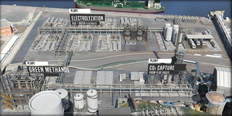- The Triskelion project aims for 156 metric tons of e-methanol production per day.
- CO2 from electricity turbines will be converted into e-methanol using renewable hydrogen.
- BASF's OASE technology is used in over 500 plants globally.
- The project supports sustainable fuel for industrial transport and chemical synthesis.

Project Overview
BASF and Forestal de Atlántico S.A. have entered into an early disclosure agreement to advance e-methanol production through carbon capture solutions. The collaboration involves BASF's OASE® blue technology, which efficiently removes CO2 from flue gases, for Forestal's Triskelion project in Galicia, Spain. The project aims to produce 156 metric tons of e-methanol per day by converting CO2 from electricity-generating turbines into e-methanol using renewable hydrogen.
Engineering and Design
The agreement facilitates BASF's input for the Front End Engineering Design (FEED), which will be developed by a third-party contractor. This process will help Forestal assess the project's technical feasibility and economic viability, enabling them to share the design with other contractors for competitive construction bids.
Technological Impact
BASF's OASE technology is a leader in gas treatment, used in over 500 reference plants worldwide. The technology will be crucial in separating CO2 from exhaust gases for e-methanol synthesis. This project represents a significant step in utilizing carbon capture technology for sustainable fuel production, particularly in industrial transportation and chemical synthesis.
Industry Implications
The Triskelion project is set to be a pioneering facility in e-methanol production, offering a more sustainable fuel alternative for industrial transportation, including international shipping. It also serves as a raw material for various chemical synthesis processes, marking a crucial step in the effective utilization of carbon capture technology.

